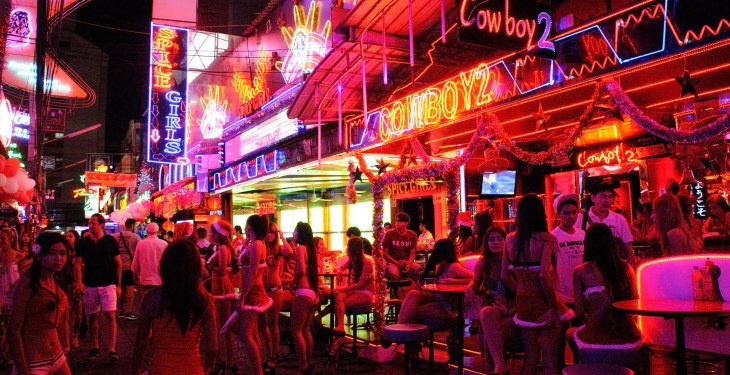What comes to mind when one thinks of Thailand? For some, it can be anything from white beaches to full moon parties, but for many others it is the booming sex industry, including: lady boys, ping pong shows, and much more. South-East Asia, and Thailand in particular, has become known internationally as a hotbed for a plethora of sexual services which seem to know no limit other than the customer’s imagination. This booming market has been thriving year after year, and continues to draw people from far and wide to explore what this lucrative industry has to offer.
Although these sexual services are often the butt of jokes for tourists due to the shock value and the sense of natural curiosity that they evoke, what is often overlooked is the fact that the women (and in many cases, men) providing these services are often victims of human trafficking.
In 2014, South-East Asia had the fastest-growing tourism industry in the world, with 96.6 million international tourists having visited that year. Part of the allure which continues to attract such a vast amount of visitors is the fact that the sex industry in this region, and especially in Thailand has been allowed to flourish due to inadequate legal enforcement when it comes to clamping down on human trafficking and sexual exploitation, as well as on transnational organized crime as a whole. Prostitution has been officially outlawed in Thailand since 1996 under the Prevention and Suppression of Prostitution Act, but the booming sex industry that thrives there to this day indicates a lack of action at a policy and law-enforcement level. What’s more, according to the 2013 Transnational Organized Crime Threat Assessment by the United Nations Office on Drugs and Crime (UNODC), it was estimated that sex trafficking within Thailand and Cambodia alone generated $181 million dollars in revenue that year.
Article 3(a) of the Protocol to Prevent, Suppress and Punish Trafficking in Persons – which defines Human Trafficking – describes exploitation as including “…at a minimum, the exploitation of the prostitution of others or other forms of sexual exploitation, forced labour or services, slavery or practices similar to slavery, servitude or the removal of organs”. Exploitation is however only one of several facets of human trafficking as this term also encompasses an array of other practices which fall under the same umbrella. Something worth noting is the use of the word “slavery” in this passage. Slavery is often regarded as a thing of the past which has long since been abolished. In reality, modern day slavery is still very much present and can be used synonymously with human trafficking, as they are one and the same.
Thailand is one of many active countries in the world when it comes to organized crime, because it is a source, transit point, and destination for narcotics and trafficked people in the form of forced labour and sexual exploitation. The victims who are forced into sex work are, in most cases, those fleeing from conflict-areas, poverty, or poor living situations where they may no longer have parents. Women or girls who fall under any of these categories are the most common targets for traffickers to prey on and they are often carefully manipulated and groomed for a period of time before being exploited. Traffickers then face the task of avoiding detection from border security when it comes to transporting the victims to the final destination, but studies conducted in southern Thailand have shown that it is in fact quite easy to travel without any obstacles or fear of being discovered. In addition to the widespread abuse, violence, and cruelty inflicted on the victims, the use of fear is the traffickers’ most powerful tool of control which greatly discourages any kind of solicitation for help.
The threat that the sex industry represents to women and children is grave. This has led groups such as International Organizations and NGOs to put in place tools and mechanisms (often in the form of treaties) to combat this phenomenon in collaboration with various governments. NATO has also voiced concern, and in 2004 put into motion the NATO Policy on Combating Trafficking in Human Beings, which has since been enforced in all NATO member countries. Many South-East Asian countries have also pledged to suppress this illicit industry. However, although these objectives are honorable in theory, in practice, there has been an ongoing tendency for some states to be directly linked to organized crime syndicates. In fact, organized crime would not be able to function without the complicity of law enforcement or government officials who essentially facilitate this phenomenon. In 2015 for instance, a major human trafficking investigation revealed the complicity of 22 law-enforcement officials ranging from police to high-ranking military personnel in connection to the discovery of mass graves of trafficked Rohingya migrants. How is a country supposed to combat organized crime when state authorities are as much a part of the problem as they are part of the solution? If governments are unable to mitigate corruption or properly enforce legal institutions, international cooperation and progress in fighting transnational crime will continue to be fragmented and stagnant.
Although the matter of state complicity is a complex issue to solve, the sex industry could also not exist without the complicity of the tourists who keep the business running. Participating in or simply attending events viewed as standard attractions helps to support the illegal practices on which so many of these shows are built. Even participating in something as insignificant or innocent as watching a ping pong show can have far-reaching and insidious consequences for the performers involved. By making more informed choices, tourists could have a very real impact on the organised crime structures that keep the sex industry flourishing by depriving them of the revenue that makes this form of business profitable.
Featured imagine: Soi Cowboy Bangkok Thailand | July 20th, 2016 by REPRESENT ASIA – http://representasianews.com/unhappy-ending-for-thailand-sex-tourism-as-minister-urges-crackdown/#prettyPhoto
Disclaimer: Any views or opinions expressed in articles are solely those of the authors
and do not necessarily represent the views of the NATO Association of Canada.




